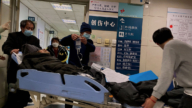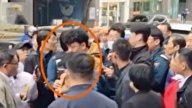【新唐人2013年11月09日讯】今年11月8号是第14个“中国记者节”,但是由于最近发生的“陈永洲事件”一波三折,让记者这一行业成了丑闻主角。今年的记者节日不仅没有庆祝的喜庆,反而都是应该“自律”、“反思”的报导。更严重的是还有媒体指称,金额超过百万的新闻敲诈案正在调查之中。请看报导。
中国仅有三个以职业命名的节日——教师节、护士节、记者节,中国记者们今年的心情却另有别样。
不久前,广东《新快报》记者陈永洲,因刊发了多篇涉及一家湖南上市公司的报导而被捕,最初被视为是一宗“记者因舆论监督遭受司法迫害”的冤案,但随着陈永洲在《央视》上承认了收“黑钱”写报导,从而让局势大逆转,官媒一致谴责记者受贿。头顶“无冕之王”光环的记者职业,也成了讨伐的目标,人们鞭鞑的对像。
今年的记者节,有人说要吸取教训,有的说要自律,有的还提议把记者节“作为反思日。”
中国政论专栏作家朱建国表示,即使陈永洲受了贿,也不能说明他揭露的事实是假的,当局用这个错误的逻辑误导民众。
中国政论专栏作家朱建国覆:“巢之下无完卵,在一个腐败的社会里,可能每一个行当都难幸免,那么新闻界出现腐败也很正常。同样是腐败,这里有主次之分,那么官员、执政党,他是腐败的源头,罪魁祸首。”
媒体、记者的噩梦还没有停止:曾遭遇负面报导的“农夫山泉”企业,日前举报了《京华时报》,指称《京华时报》捏造事实进行虚假报导,使公司严重受损。
另外,香港《明报》也透露,一宗涉嫌新闻敲诈的案件,金额超过百万元人民币,正在调查当中。
前《山西青年报》记者高勤荣,因报导山西运城贪腐案,被关冤狱8年。
高勤荣:“记者收红包在中国是有这种现象,而且有一些不良文人收封口费确实比较多,但是这个也就是由于法制不健全、制度不健全造成的。”
早在2003年,美国的一项研究就显示,在66个国家“有偿新闻”指数排名榜上,中国新闻界“雄居”第一位。
一位曾担任地方县长的官员日前也透露,一年收到的近百封记者信件中,绝大多数是以发所谓“负面报导”为筹码,谋求红包、吃饭、订报纸等不同目地。
旅居美国的中国经济学者何清涟用“大黑吃小黑”的评语,对陈永洲事件做了总结。她说:陈永洲事件揭开了中国政界、企业界与媒体业相互为用、大黑吃小黑的三重黑幕,企业之间挟政治势力的恶性竞争、在权力与金钱下游走的中国媒体、权力介入每个角落并扭曲一切。
时事评论员夏小强:“中共控制下的所有媒体都是党媒、党的喉舌、它其实是党的工具,目地是隐瞒真相和维护权力。”
北京外国语大学新闻系教授展江,也在他的专栏中指出,不拿红包的记者远远少于拿红包的记者。目前的一个现实是:媒体自身普遍“,腐败的记者和媒体再去揭露别人的腐败。这就陷入了一个奇怪的怪圈。
朱建国:“在今这种大腐来反腐的情况下,只有靠小腐反戈一击揭露大腐,这个社会才能真正前进。即使一个腐败的记者,他又检举了腐败,他依然是正能量,依然有益社会。”
朱建国说,腐败记者也可以立大功。
采访/陈汉 编辑/宋风 后制/萧宇
China Journalist’s Day Follows News Extortion Case
And Scandals
Nov. 8 2013 is the 14th China Journalist’s Day.
But the recent “Chen Yongzhou incident" makes the
journalism industry become the center of scandals.
This year Journalist’s Day doesn’t have an atmosphere of
happiness but many reports of self-discipline and self-reflection.
More seriously, there’s a report saying news extortion with
millions of dollars involved is being investigated.
Let’s see the report.
There are only three holidays named after careers:
Teacher’s Day, Nurse’s Day, and Journalist’s Day.
Chinese journalists have different feelings this year.
Chen Yongzhou, reporter at Guangdong newspaper
New Express, was arrested for writing several reports
about a company in Hunan Province.
The case was initially considered injustice due to the
persecution of the reporter’s opinion supervision.
But the situation changed when CCTV aired Chen’s
confession for taking bribes to do the reports.
Chinese official media unanimously condemned
the reporter for taking bribes.
The journalism career used to be respected,
but now has become the target of condemnation.
During the Journalist’s Day this year, some people say
they should learn the lesson.
Some others say they should use self-discipline.
Some also suggested making Journalist’s Day
into “Reflection Day".
Chinese political commentary columnist, Zhu Jianguo says
that even if Chen Youzhou had taken bribes, that didn’t mean
what he reported on was untruthful.
The authority is misleading people with this wrong logic.
Zhu Jianguo: “There’s no good egg in a turned over nest.
No career can avoid corruption in a corrupted society,
including journalism. It’s normal to have corruption everywhere.
There’s priority and minority among corruptions. The
corruption of officials and ruling party is the root, the culprit."
The nightmare of media and journalists has not stopped.
Nongfu Spring company recently reported Beijing News
newspaper for fabricating facts to make false reports.
This led to severe economic loss for the company.
Hong Kong newspaper Ming Pao reveals a news extortion
involving over a million RMB is under investigation.
Former reporter at Shanxi Youth Newspaper Gao Qinrong
was sentenced to eight years when reporting a corruption
case in Yucheng of Shanxi Province.
Gao Qinrong: “There are phenomenona of taking bribes
among journalists in China.
But there are truly a lot of solars taking hush money, which
is also caused by an unsound legal and social system."
There was a survey conducted by the United State in 2013
that China has the most paid news reporting among the 66
countries that are on the ranking list.
A former Chinese county official recently revealed that the
majority of the 100 letters or so he received in a year when
he was in the position were bribes for negative reports,
asking for bonus, inviting meals, ordering newspapers etc.
He Qingliang, Chinese economist living in the US,
made commentary on the Chen Yongzhou incident.
She says, “The Chen Yongzhou incident revealed three
inside stories of Chinese politics; collusions between
enterprises and media, as well as double-crossing.
Enterprises have unhealthy competitions using
political power.
Chinese media is used by power and money. Power is
involved in every corner in Chinese society."
Political commentary Xia Xiaoqiang: “All the media under
Chinese Communist Party (CCP) rule are party mouthpieces.
Media is the tool of the CCP for the purpose of hiding the
truth and maintaining power."
Zhan Jiang, journalism professor at Beijing Foreign Studies
University pointed out in his column that there are many
more reporters who take bribes than who don’t in China.
The current fact is that media corruption is common.
Corrupt reporters and media reveal each others’ corruption.
This is a vicious circle.
Zhu Jianguo: “To fight corruption under such corrupted
environment in China, we can only rely on small corruption
to reveal the big corruption to make development in society.
Even if a reporter is corrupt, but he reports a big corruption,
story then he’s still a positive power, still benefiting society."
Zhu Jianguo says corrupt reporters can also hit the big time.




























